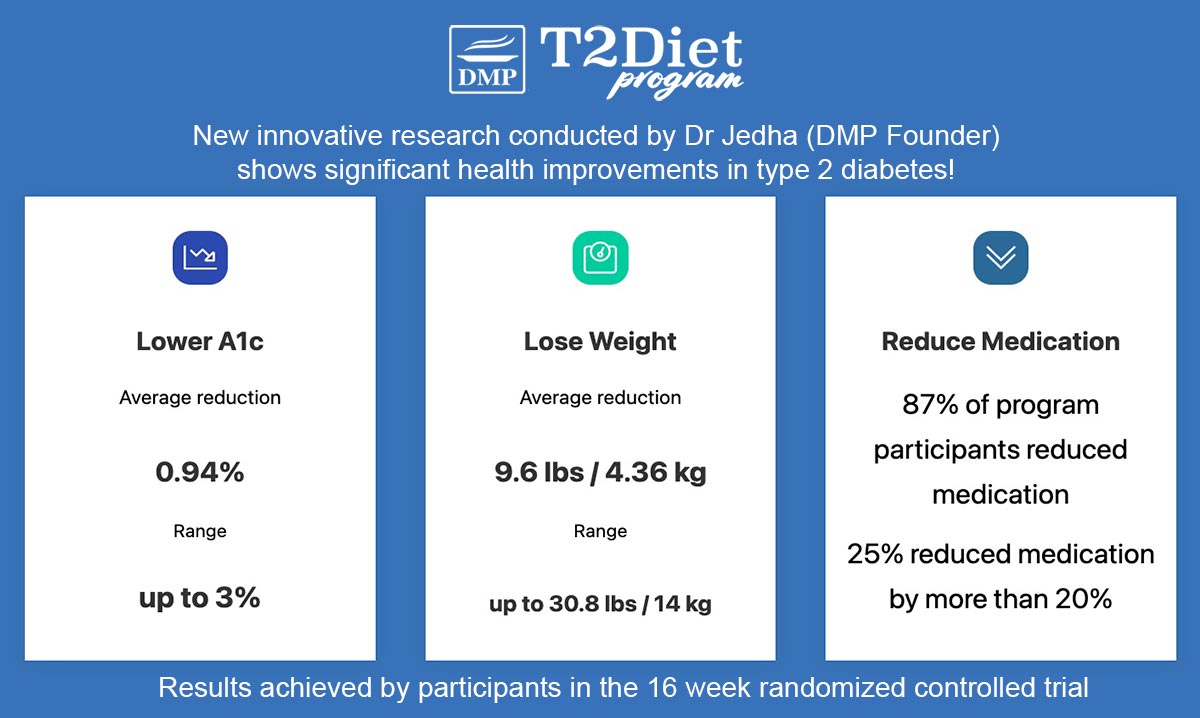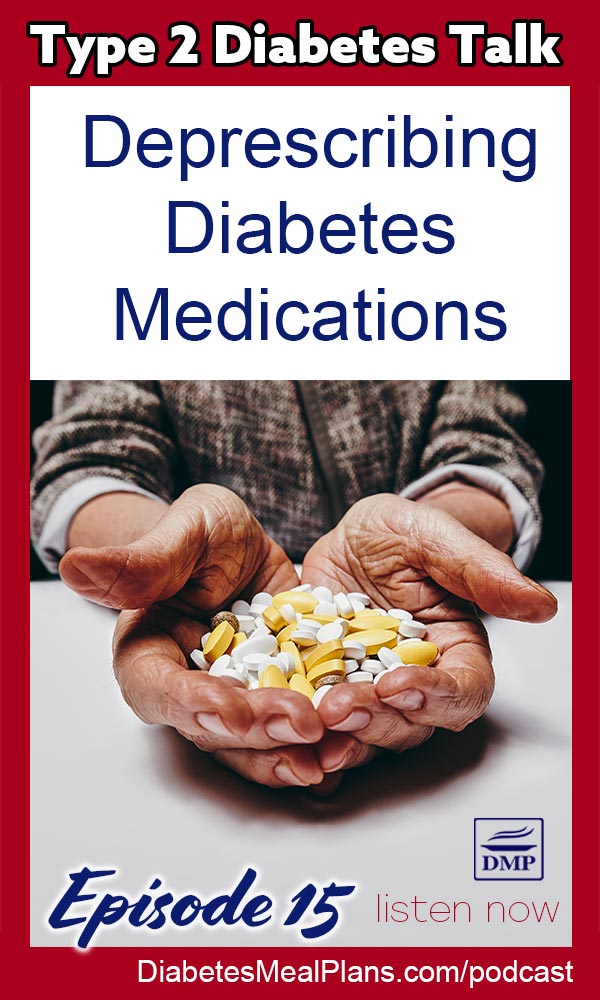Table of Contents[Hide][Show]
In this episode, you’re set to discover the empowering world of deprescribing diabetes medications and learn how a proactive approach to your health will completely transform your diabetes health from here and moving forward.
LISTEN TO THE PODCAST
CHAPTERS
0:00 Medication March Ground Covered
3:21 Glucose-Lowering Medications
6:35 Healthy Lifestyle & Limited Effect of Meds
9:42 Do The Risks Outweigh The Benefits?
11:49 Has Diabetes Become Overmedicalized?
13:36 Deprescribing Facts
18:32 Is It Really Possible To Stop Diabetes Medications?
MEMBERS: Access additional member perks inside the members site.
Overview
Throughout our Medication March series, we’ve guided you through various aspects of diabetes management, highlighting the critical role of medication and the importance of being informed and proactive.
As you’ve journeyed with us, you’ve discovered eye-opening facts and heard firsthand accounts of the challenges associated with medication management, all of which have underscored the necessity of being educated, being informed and sparking communications with your healthcare provider.
In this concluding episode of our Medication March series, you’ll delve deeper into understanding glucose-lowering medications, their effectiveness, and the fascinating concept of deprescribing.
You’ll learn, in brief, about different types of glucose-lowering medications such as Metformin, Sulfonylureas, DPP-4 inhibitors, and SGLT2 inhibitors, each with its unique role in controlling blood sugar.
It’s essential to recognize that while these medications aid in managing diabetes, the most significant impact comes from a healthy lifestyle, particularly nutrition, as emphasized by the American Diabetes Association (ADA) guidelines, diabetes guidelines around the globe and evidence from proven programs like our T2Diet Program.

The long-term effects of any medications are crucial considerations. Metformin, for instance, can lead to vitamin B12 deficiency over time, and the long-term risks associated with newer drugs like Ozempic and Wogovy remain uncertain, as the side effects are still becoming apparent. As you age, weighing these factors becomes increasingly important to balance the benefits and potential harms of medication.

Deprescribing, the practice of reducing or stopping medications when they are no longer necessary, is a key topic of this final episode of the Medication March series. You might be curious if it’s possible to reduce or stop taking your diabetes medications without adverse effects. The evidence suggests it is, particularly for those with stable or low A1c levels ≤7%. Deprescribing can minimize side effects and encourage a stronger focus on lifestyle changes in diabetes management, and in the long term, only you will reap the benefits of this.
Despite its benefits, deprescribing is not commonly practiced, often due to unclear guidelines and concerns about outcomes. However, if your A1c levels are under control, ≤7%, and you’re dedicated to a healthy lifestyle, it’s time for you to strike the all important conversation with your doctor – deprescribing!
Many in our community, like you, have wondered if it’s possible to stop medications such as Metformin or reduce insulin usage. The answer is yes, with a proactive approach centered around diet and nutrition as the primary method of treatment, it is certainly possible!
Remember, needing medication at one point doesn’t mean a lifelong commitment to it. All of the evidence shows that when people achieve lower A1c levels and cease their medication, their blood sugar often remains stable, indicating that the body is effectively regulating blood sugar without ongoing medication.
So, what steps can you take?
Every doctor’s appointment is an opportunity for you to advocate for your own health. Bring your medications and supplements for review and inquire about reducing or eliminating any. If a new medication is proposed, ask about its necessity and explore alternative approaches.
Reducing or stopping medications is indeed possible with the right approach, particularly one that emphasizes natural treatment strategies, such as we support people to do here at DMP.
Importantly, you don’t have to do it alone, so please explore our programs and services and we’ll help you to reduce or get off your medications, like we’ve helped many others before you.
Send your doctor to our website to access the resources below about deprescribing medication.
And please, make sure you share the Medication March series far and wide. Your help in spreading awareness and knowledge can significantly impact the diabetes community.
Together we can make a big difference!
RESOURCES
To help you research the medications you are taking:
For health professionals, on deprescribing:
- Adapting medication for type 2 diabetes to a low carbohydrate diet
- Measuring medication effectively
- A Guide to Deprescribing Antihyperglycemics
MEMBERS: Access additional member perks inside the members site.
Subscribe to Type 2 Diabetes Talk on: Apple | Spotify | Amazon Music | Audible | YouTube | Podcast Index | Player FM | and more…
References
-
- ADA Medical Care Guidelines, Chapter 9 Pharmacotherapy: https://diabetesjournals.org/care/article/47/Supplement_1/S158/153955/9-Pharmacologic-Approaches-to-Glycemic-Treatment
- Alexopoulos AS, Yancy WS, Edelman D, Coffman CJ, Jeffreys AS, Maciejewski ML, Voils CI, Sagalla N, Barton Bradley A, Dar M, Mayer SB, Crowley MJ. Clinical associations of an updated medication effect score for measuring diabetes treatment intensity. Chronic Illn. 2021 Dec;17(4):451-462. doi: 10.1177/1742395319884096. Epub 2019 Oct 25. PMID: 31653175; PMCID: PMC7182482.
-
- Warning on Semaglutide for ileus: https://www.forbes.com/sites/brucelee/2023/12/03/fda-adds-warning-to-ozempic-label-about-ileus-intestinal-blockage/?sh=1980e4954e1c
-
- Budnitz DS, Shehab N, Lovegrove MC, Geller AI, Lind JN, Pollock DA. US Emergency Department Visits Attributed to Medication Harms, 2017-2019. JAMA. 2021 Oct 5;326(13):1299-1309. doi: 10.1001/jama.2021.13844. PMID: 34609453; PMCID: PMC8493432.
-
- DiSogra RM, Meece J. Auditory and Vestibular Side Effects of FDA-Approved Drugs for Diabetes. Semin Hear. 2019 Nov;40(4):315-326. doi: 10.1055/s-0039-1697645. Epub 2019 Oct 9. PMID: 31602095; PMCID: PMC6785333.
-
- Dominique A. de Groot, Marloes de Vries, Karlijn J. Joling, Jos P. C. M. van Campen, Jacqueline G. Hugtenburg, Rob J. van Marum, Annemieke M.A. Vermeulen Windsant-van den tweel, Petra J.M. Elders, Hein P. van Hout, Specifying ICD9, ICPC and ATC codes for the STOPP/START criteria: a multidisciplinary consensus panel, Age and Ageing, Volume 43, Issue 6, November 2014, Pages 773–778, https://doi.org/10.1093/ageing/afu075.
-
- Wang X, Liu K, Shirai K, Tang C, Hu Y, Wang Y, Hao Y, Dong JY. Prevalence and trends of polypharmacy in U.S. adults, 1999-2018. Glob Health Res Policy. 2023 Jul 12;8(1):25. doi: 10.1186/s41256-023-00311-4. PMID: 37434230; PMCID: PMC10337167.
Deprescribing in general
-
- Dominique A. de Groot, Marloes de Vries, Karlijn J. Joling, Jos P. C. M. van Campen, Jacqueline G. Hugtenburg, Rob J. van Marum, Annemieke M.A. Vermeulen Windsant-van den tweel, Petra J.M. Elders, Hein P. van Hout, Specifying ICD9, ICPC and ATC codes for the STOPP/START criteria: a multidisciplinary consensus panel, Age and Ageing, Volume 43, Issue 6, November 2014, Pages 773–778, https://doi.org/10.1093/ageing/afu075
-
- Farrell B, Black C, Thompson W, McCarthy L, Rojas-Fernandez C, Lochnan H, Shamji S, Upshur R, Bouchard M, Welch V. Deprescribing antihyperglycemic agents in older persons: Evidence-based clinical practice guideline. Can Fam Physician. 2017 Nov;63(11):832-843. PMID: 29138153; PMCID: PMC5685444.
-
- Li J, Fagbote CO, Zhuo M, Hawley CE, Paik JM. Sodium-glucose cotransporter 2 inhibitors for diabetic kidney disease: a primer for deprescribing. Clin Kidney J. 2019 Aug 14;12(5):620-628. doi: 10.1093/ckj/sfz100. PMID: 31583087; PMCID: PMC6768299.
-
- Medication management – deprescribing: https://www.primaryhealthtas.com.au/resources/deprescribing-resources/
-
- Wang X, Liu K, Shirai K, Tang C, Hu Y, Wang Y, Hao Y, Dong JY. Prevalence and trends of polypharmacy in U.S. adults, 1999-2018. Glob Health Res Policy. 2023 Jul 12;8(1):25. doi: 10.1186/s41256-023-00311-4. PMID: 37434230; PMCID: PMC10337167.
-
- Abdelhafiz et al. Can hypoglycaemic medications be withdrawn in older people with type 2 diabetes? 2014.
https://onlinelibrary.wiley.com/doi/full/10.1111/ijcp.12455
- Abdelhafiz et al. Can hypoglycaemic medications be withdrawn in older people with type 2 diabetes? 2014.
-
- Liss et al. Treatment Modification After Initiating Second-Line Medication for Type 2 Diabetes.The American Journal of Managed Care.2023. https://www.ajmc.com/view/treatment-modification-after-initiating-second-line-medication-for-type-2-diabetes
General references
-
- Seidu S, Kunutsor SK, Topsever P, Hambling CE, Cos FX, Khunti K. Deintensification in older patients with type 2 diabetes: A systematic review of approaches, rates and outcomes. Diabetes Obes Metab. 2019 Jul;21(7):1668-1679. doi: 10.1111/dom.13724. Epub 2019 Apr 29. PMID: 30938038.
-
- Wang X, Liu K, Shirai K, Tang C, Hu Y, Wang Y, Hao Y, Dong JY. Prevalence and trends of polypharmacy in U.S. adults, 1999-2018. Glob Health Res Policy. 2023 Jul 12;8(1):25. doi: 10.1186/s41256-023-00311-4. PMID: 37434230; PMCID: PMC10337167.
-
- Dominique A. de Groot, Marloes de Vries, Karlijn J. Joling, Jos P. C. M. van Campen, Jacqueline G. Hugtenburg, Rob J. van Marum, Annemieke M.A. Vermeulen Windsant-van den tweel, Petra J.M. Elders, Hein P. van Hout, Specifying ICD9, ICPC and ATC codes for the STOPP/START criteria: a multidisciplinary consensus panel, Age and Ageing, Volume 43, Issue 6, November 2014, Pages 773–778, https://doi.org/10.1093/ageing/afu075.
-
- Qaseem A, Wilt TJ, Kansagara D, Horwitch C, Barry MJ, Forciea MA; Clinical Guidelines Committee of the American College of Physicians; Fitterman N, Balzer K, Boyd C, Humphrey LL, Iorio A, Lin J, Maroto M, McLean R, Mustafa R, Tufte J. Hemoglobin A1c Targets for Glycemic Control With Pharmacologic Therapy for Nonpregnant Adults With Type 2 Diabetes Mellitus: A Guidance Statement Update From the American College of Physicians. Ann Intern Med. 2018 Apr 17;168(8):569-576. doi: 10.7326/M17-0939. Epub 2018 Mar 6. PMID: 29507945.
- Farrell B, Black C, Thompson W, McCarthy L, Rojas-Fernandez C, Lochnan H, Shamji S, Upshur R, Bouchard M, Welch V. Deprescribing antihyperglycemic agents in older persons: Evidence-based clinical practice guideline. Can Fam Physician. 2017 Nov;63(11):832-843. PMID: 29138153; PMCID: PMC5685444.
- Li J, Fagbote CO, Zhuo M, Hawley CE, Paik JM. Sodium-glucose cotransporter 2 inhibitors for diabetic kidney disease: a primer for deprescribing. Clin Kidney J. 2019 Aug 14;12(5):620-628. doi: 10.1093/ckj/sfz100. PMID: 31583087; PMCID: PMC6768299.


Leave a Reply